- Home
- Ian McDonald
Empress of the Sun Page 2
Empress of the Sun Read online
Page 2
‘I’ll …’ Everett began, but Sharkey whirled away, whipped the shotguns from his holsters and stalked out of the clearing into the hooting, whistling, chirruping, singing forest shadows.
‘Sen …’
She had tied her hair back and pulled her goggles down. She was steampunk funk queen and Everett’s heart broke looking at her at work in the hatch, skinny as a whippet, sweaty, grease-smudged, totally absorbed in repairing her ship, her home. Her family.
He had never felt so alone, not even when he had hijacked Paul McCabe’s Heisenberg Gate and sent himself to Earth 3. There he was an adventurer. Here he was a survivor. There he had a plan. Here all his plans were impaled upon tree branches. And everyone hated him.
Everett tried to think of the people who loved him, his friends, his family. He froze when he realised he couldn’t see his mum’s face any more. He could see her hands, her clothes, her shoes, but not her face. He couldn’t see Victory-Rose either, or Bebe Ajeet, or his many Punjabi aunts and uncles; he could hardly remember friends like Ryun and Colette. All that remained of her were her Doc Marten boots and hair – both shocking pink. He had only been away from them for a few weeks, but so many worlds and people and so much fear and excitement and strangeness had come between Everett and the people he loved that it was a screen like frosted glass, that showed shapes and outlines but hid details. The only face he could see was his dad’s, in that moment on the twenty-second floor of the Tyrone Tower when Charlotte Villiers turned the jumpgun on him. He saw that too clearly. It was as if the sharpness and brightness of that final glance washed out all the other faces.
He had never felt more alone.
He couldn’t stop tears. They were the simple and most natural and right thing to come, but he would die rather than let the people working on the engine see them. He turned and ran into the jungle.
*
The river stopped Everett. The trees ended abruptly and the bank gave way so suddenly and steeply he went skidding down between boulders and exposed tree roots. He had let his body carry him without any conscious thought. Just running. Just hurdling branches and huge tree roots. He could have run on and on until he couldn’t find his way back. Here, at the river’s edge, he could faintly hear the sound of Airish power tools and lifting tackle. There was a way back. There was always a way back.
Trees taller and grander than any on Earth soared above Everett. He could see the sky. A small fall of water between two boulders had hollowed out a pool. The water was deep and clear, cool and calling. Sun and water touched the hurt and guilt and loneliness. In a moment he was kicking off boots, wriggling out of ship togs. He splashed into the pool, lolled back. Cool deep water rose up over his chest. Everett took his feet off the bottom, kept himself upright with tiny movements of his hands and feet.
The water blessed him. He was alone, but not lonely. He had never been skinny-dipping before. He loved the sensual feel of wild water touching every part of his body. I have swum like this before, he realised, before I was born, naked, in the waters inside my mum.
It was a bit of a freaky thought.
Everett paddled round to where a ray of sunlight shone through a gap in the canopy of red leaves. Sun fell on his face. He closed his eyes. Opened them with a shock.
The sun.
There was something wrong with the sun. It was still full in his face. It shouldn’t be. It should have moved across the sky. It hadn’t. It was lower, closer to the lower edge of the gap in the branches, but still full in his face. The sun didn’t move on an arc from east to west. It was moving straight up and down.
His calculations. He had calculated for a jump from a spherical planet to another spherical planet. The geometry of the world …
‘No way!’ Everett shouted, surging straight up out of the water. Winged things burst upwards in panic from the trees. ‘No! This is insane.’ But the numbers were running in his head, connecting with other numbers, with theories and physical laws, painting a picture of the world that fitted – that was the only explanation – with the facts at hand.
He had to get back to the crew. They would listen to him when he told them what he had worked out about this world. They had to listen to him. He waded to the riverbank.
His clothes. Where were his clothes? He’d left them on this rock, neatly folded, weighted down with his boots in case the wind got up.
Everett heard a noise. There, behind that root buttress. A rustle. A movement. A … giggle? Everett cupped his hands over his groin. Water streamed from him.
‘Sen?’
It was a giggle.
‘Sen! Have you got my togs?’
No answer. No movement.
‘Don’t mess around! There’s something important you need to know. Mega.’
‘Come and get them!’
‘Sen!’
She could wait all day for him to come out of the water.
‘Okay then, since you think it’s so funny …’ Everett waded out of the river. He let go his covering hands. He heard a whoop from behind the tree root. Everett imagined himself from Sen’s point of view. He looked okay. Better than okay; he looked pretty good.
‘Remember I dressed you at Bona Togs?’ Sen shouted. ‘Well, I’s going to dress you again.’ A hand draped two socks over the sloping root. ‘Come and get ’em!’
‘I will,’ said Everett Singh. He heard a squealing shriek of delight and laughter, then a flurry of moving foliage. He pulled on the socks: heavy knit, thick rib top, like the ones Sen wore. He felt dumb in just socks.
‘Come on!’ Sen shouted from behind a brake of silvery cane. She waved his boots at him, one on each hand.
‘Sen, this is important. This world – it’s …’
‘That scar’s really healing up good,’ Sen called from deeper in the forest.
Everett had almost forgotten about the scar his alter’s laser had scorched across his side at the Battle of Abney Park Cemetery. Sen’s careless comment knocked him back into the pain and humiliation. He had been badly beaten. He would wear the mark of his enemy for the rest of his life. Everett had unfinished business with alter-Everett.
Now Sen hung his ship shorts from a low branch.
‘Sen! Don’t mess around!’ Everett shouted as he struggled to get feet through legs.
‘You wear too many clothes!’ Sen called from a new hiding place. ‘It’s bad for you.’ She draped his T-shirt over a spiny shrub. She had cut the sleeves off and shortened it. It was not quite her crop-top level, but shorter than any straight E10 omi would be seen in. Bare-chested, Everett strode to retrieve it.
Something splintered softly under his left boot, and his ankle went deep into something soft and wet and sticky. A waft of rot and sickness wafted up. Everett looked down. His heart jolted, he almost puked in shock. His left foot was embedded in the ribs of a mouldering human corpse. Empty eye sockets stared up at him from a skull clothed with rags of skin. Vile liquids and rotting organs leaked from the blackened, burst skin. Everett tried to extricate his foot. Decaying things glooped and sucked.
‘Sen!’ he yelled. ‘Sen!’
‘Uh-uh, Everett Singh, you come and get it.’
‘Sen!’ His voice said, No jokes any more.
She came running, hurdling lightly over roots and fallen branches.
‘Everett, what is it? Oh the Dear.’
Everett had followed the trace truly and accurately. Someone had been banished to this world by the jumpgun.
Sen held two hands out to Everett.
‘I’s got you, omi. Walk towards me. Come on, Everett Singh.’
He took her hands and pulled his foot out of the dead thing. He could feel gross corpse stuff on his skin. He would never be able to get it clean again. But that was not the true horror. The horrible, terrible, all-devouring fear was who that corpse might be.
‘Sen, can you look at it? Is it?’
Sen understood at once. ‘It’s not him. Do you hear me? It’s not him.’
Everett shook
with released tension. He thought he might throw up now, not from the vile rotting nausea of the corpse, but from relief at who the corpse was not. His dad. He heard Sen mumble something in Palari. He knew it pretty well now, but Sen spoke so low and fast, with so many dialect words, he could not make her out.
‘Sen, what is it?’
‘He’s dressed Airish style. I think I knows it. I think it’s ’Appening Ed.’
At first Everett could not place the name, then he remembered. Charlotte Villiers had led her Sharpies into Hackney Great Port to try to seize the Infundibulum by force. She had been met by a mob of roused, anarchic Airish, who had no truck with police on their territory. They had been led by a short, angry man – ’Appening Ed. Charlotte Villiers had pulled a gun and made him disappear. It had been the first time Everett had seen what a jumpgun could do. So this was where he had been sent. And something in this red rainforest had killed him. This red rainforest, in this world where the sun didn’t obey normal physics, and even the world didn’t obey proper, spherical geometry.
‘Sen, we need to get back to the crew. There’s something you need to know about this world. Something really important.’
3
Charlotte Villiers drew on tight calfskin gloves as she surveyed London from the twenty-second floor window of the Tyrone Tower. Snow crowned the angels that stood atop the Gothic skyscrapers and draped cloaks and capes and stoles around the shoulders of the crouching lions and griffons and mythological beasts that gazed down from the tower-tops on to the bustling streets. Snow sheeted from the hulls of the airships as they cast off from the great iron tower of Sadler’s Wells skyport and turned on to their flightpaths. Snow on train roofs made them winding snakes, slinking along their elevated lines. Snow piled in drifts and banks at the sides of the streets far, far below, burying bicycles and rubbish bins and electricity charge points that would not return until a thaw. Snow trodden to treacherous ice-slicks on the walkways, citizens sliding and tottering in tiny nervous steps, coat collars turned up and hats pulled down, breath steaming.
‘I’m sick of winter. Could we not for once move the Praesidium somewhere warm?’
Charles Villiers, Charlotte Villiers’s alter and Plenipotentiary from Earth 4, lifted a forefinger to Charlotte Villiers’s cigarette in its ivory holder. A flame lit from his fingertip and she winced in distaste. Thryn technology, of course, but the Thryn would never have designed anything so crass. Restrained. Poised. Enigmatic. Charlotte Villiers admired the Thryn much more than the humans of E4, her alter included. Earth 4 had glutted itself on Thryn technology so greedily that its people had not developed a technology or made a scientific discovery of their own in thirty years. They were addicts. Charlotte Villiers despised addiction. It was a vile weakness, whether alcohol, narcotics, sex, power, or alien technology.
‘E8 is pleasant in its northern hemisphere at this time of year, my cora.’
‘Earth 8 is an ecological wreck with runaway greenhouse effect,’ Charlotte Villiers snapped. ‘I do not suit favela chic.’ She pulled the fur stole tight around her neck, not because of the cold beyond the window but at her alter’s use of the word ‘cora’. Earth 5 had given the Plenitude the terms of familiarity and endearment between alters – a twin in a parallel universe, closer than a sibling or a lover; you, but so very deeply, completely not you. Hearing the word on her alter’s lips made Charlotte Villiers shiver. She frequently wondered how Charles could be her alter at all. He was in no way her intellectual equal. And so childishly simple to manipulate. He was her coro in name only. Out of all her fellow Plenipotentiaries, she respected only the Earth 7 conjoint Jen Heer Fol and Ibrim Hoj Kerrim. The Earth 2 Plenipotentiary might not possess her sheer edge of cold intellect, but he was a consummate diplomat and politician, in a world where those qualities so often contradicted each other. She had almost betrayed her hand to him once, in the heat of action, when she had seen that Everett Singh intended to send himself through the E10 Heisenberg Gate and she had pulled a gun on him. She had talked her way out of the incident, but Ibrim Hoj Kerrim was wily, graceful and completely incorruptible. It would require her very sharpest, cleanest, most deadly plan to neutralise him in the Praesidium. But she had no doubt that she would succeed. Her only equal, the only one to best her, time and again, was her enemy, Everett Singh. Her enemy, her prey. In the end you will give me what I desire, with your own hand. Let us match my will to your wits, Everett Singh. Charlotte Villiers took a draw on her cigarette, breathed a coil of smoke into the air.
‘At least the food’s decent on Earth 7.’
A knock at the door.
‘Enter.’
A bellboy in the high-collared embroidered jacket of the Service Corps entered and clicked his heels respectfully.
‘These are diplomatic boxes you want transported, Excellency?’
‘They are, Lewis,’ Charlotte Villiers said.
‘Shall I move them all or are there any you wish to take personally?’
‘I trust you, Lewis. I will be carrying personal effects only.’
‘We will have everything prepared for you.’
‘Thank you, Lewis.’
Every six months the Praesidium of the Plenitude of Known Worlds rotated to a new parallel Earth. The theory was to promote equality and democracy. Charlotte Villiers considered it a sop to political correctness. She would have been quite happy to have a permanent headquarters on Earth 2 – the weather was good, the shopping excellent, the clothing and cuisine outstanding – or even Earth 5: those horses and carriages and the elegant, well-proportioned architecture and fashion were graceful and picturesque. The settling-in was tedious and disruptive, even if she could commute home to Earth 3 by Heisenberg Gate. Charlotte Villiers had endured four moves since ascending to the Plenipotentiate and it still seemed that no sooner were all the files unzipped and shelved than it was time to zip them, box them and ship them on again.
‘I shall have to brush up my Anglische,’ she said. ‘It’s such an ugly language. It sounds like retching.’
‘You want one of these, cora,’ Charles Villiers said. He opened his hand to show a thumbnail-sized chip. ‘It comes with a special frame; you wear it like a pair of glasses. Beams the language into the back of your eye. Brilliant.’
‘Call me old-fashioned, but I prefer not to have a language burned into my forebrain by some memory chip,’ Charlotte Villiers said. The idea of someone else’s voice, words, thoughts in her head filled her with disgust. Charlotte Villiers’s brain was guarded, untouchable, entirely her own. Dark secrets were locked within. ‘Anything from the tracker?’ She had sent her agent, Everett Singh’s E4 alter, on a highly illegal Heisenberg Jump to the forbidden plane of Earth 1 to plant a quantum tracking device on the airship Everness. He had gone with one of the Thryn Sentiency’s most powerful personal-combat units. He had come back with nothing but a suit liner and a backpack.
Charles Villiers checked his mobile phone. ‘No data yet.’
‘Are you sure it’s working?’
‘It’s Thryn,’ her alter said. ‘It’s infallible.’
Charlotte Villiers raised an eyebrow. Earth 4ers were so trusting of their technology. Charlotte Villiers preferred to work with people. Especially people she could manipulate or threaten. Scared people were trustworthy.
‘Has he even planted the thing?’ He could have ditched everything – Thryn battle suit, hedgehoppers, tracker – and run for home at the first sight of the Nahn. Charlotte Villiers knew enough of the nanotech plague that had engulfed Earth 1 to have doubts about her own bravery in the face of the Nahn. Invading you, dissolving you, incorporating you, taking your body, your mind, smelting them into an alloy of all the others it had absorbed: the Nahn was the same horror as the Earth 2 language implants, a thousand times magnified. The Nahn was violation.
‘He says he has,’ Charles Villiers said.
‘There are liars, gross liars and fourteen-year-old boys,’ Charlotte Villiers said. ‘But I still have his fam
ily. His real family.’
4
Overnight the snow had melted into the endless wet grey of January. Everett M Singh looked out at the procession of car headlights in the morning gloom as the Roding Road school run began. Car exhausts steamed in the chill. He still didn’t understand the logic of running a transport system on liquid-fuel/internal-combustion engines.
On the windowsill the Nahn buzzed in its glass prison. Everett M bent down to peer at the thing in the jar. Laura had almost caught him last night. He had stayed awake, the Nahn spider clutched tight in his hand, until all the lights went off and the noise of television and radio and teeth being cleaned came to an end. He had gone quietly downstairs. The new Thryn implants meant he could move quickly and quietly. Not quickly and quietly enough. Laura came downstairs, woken by the noise, to find Everett M two-thirds of the way down the jar of peanut butter.
‘Everett, I know guys your age are always starving, but I mean, spooning it into you …’
Everett M had grinned sheepishly and tightened his grip on the Nahn spider in his left hand.
‘You know, since you came back there’s been no filling you. Did they give you a pair of hollow legs or something? And there’s not a pick of weight on you. Put the light out when you’re finished.’
The peanut butter went some way to filling the cold gnawing hunger that never went away, but what Everett had really wanted was the jar. He rinsed it out and, before the Nahn spider could make a break for freedom, clapped his hand over the opening and shook the nano-device inside. In an instant the lid was on. That was the reason for the peanut butter. It was farmer’s market organic Fairtrade crunchy peanut butter (it had been pretty good by the spoonful) and it had a metal lid. Every other jar in the kitchen had a plastic lid. The Nahn would have been able to feed on that plastic; grow and escape.
The Nahn spider was aware of him. It scuttled around the jar to turn what passed for a face his way. Sensor-eyes the size of pinpoints opened up to analyse him. The spider-thing scrabbled at the sides of the jar, but not even Nahn technology could get a grip on the smooth glass.

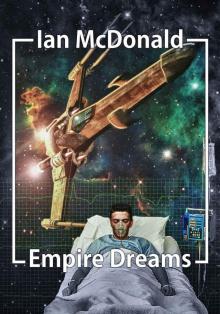 Empire Dreams
Empire Dreams The Menace from Farside
The Menace from Farside Luna: Moon Rising
Luna: Moon Rising Moon Rising
Moon Rising Desolation Road dru-1
Desolation Road dru-1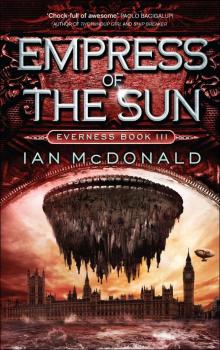 Empress of the Sun
Empress of the Sun Ares Express dru-2
Ares Express dru-2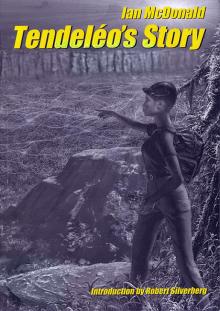 Tendeléo’s Story
Tendeléo’s Story River Of Gods
River Of Gods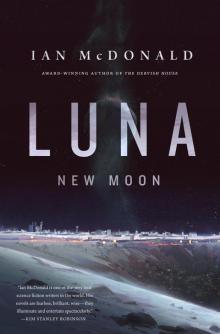 Luna
Luna![Cyberabad Days - [River of Gods 02] Read online](http://i1.bookreadfree.com/i1/03/29/cyberabad_days_-_river_of_gods_02_preview.jpg) Cyberabad Days - [River of Gods 02]
Cyberabad Days - [River of Gods 02]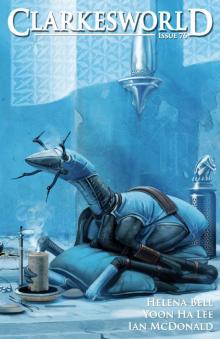 Clarkesworld Magazine Issue 76
Clarkesworld Magazine Issue 76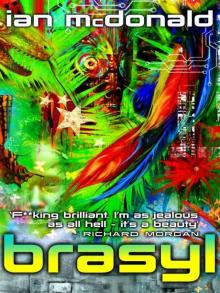 Brasyl (GollanczF.)
Brasyl (GollanczF.)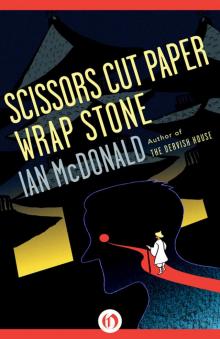 Scissors Cut Paper Wrap Stone
Scissors Cut Paper Wrap Stone Chaga
Chaga Time Was
Time Was Cyberabad Days
Cyberabad Days Be My Enemy
Be My Enemy Changa
Changa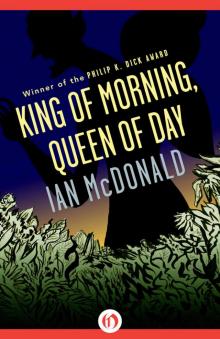 King of Morning, Queen of Day
King of Morning, Queen of Day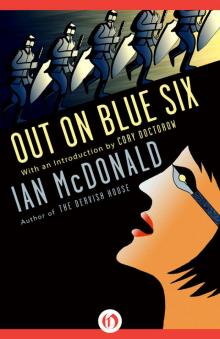 Out on Blue Six
Out on Blue Six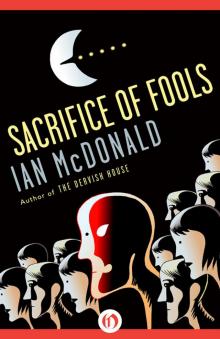 Sacrifice of Fools
Sacrifice of Fools Desolation Road
Desolation Road Luna--Wolf Moon--A Novel
Luna--Wolf Moon--A Novel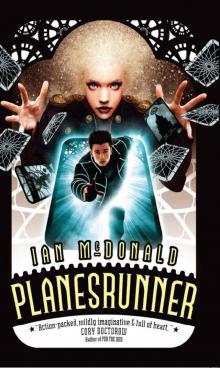 Planesrunner (Everness Book One)
Planesrunner (Everness Book One) Ares Express
Ares Express